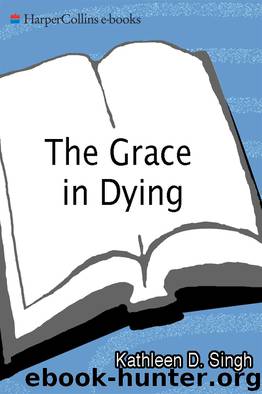The Grace in Dying by Kathleen D. Singh

Author:Kathleen D. Singh
Language: eng
Format: epub
Publisher: HarperCollins
The Psychospiritual Stages of Dying
All religions begin with the cry “Help!”
William James
This very earth is the Lotus Land of Purity; And this body is the body of Buddha.
Hakuin
Dying is 180 degrees from birthing. Any mother in the world can tell you with what travail life comes into form. For life to leave form requires equal travail. We were not designed to leave the body easily. A vast array of survival instincts and mechanisms are in place to protect the game of individuality. It is hard work to die.
It is hard work for every interrelated, interpenetrating facet of our being: physical, emotional, psychological, and spiritual. The developmental task placed before us in dying is the task of finding the courage to be in the face of a lonely death. The challenge of the dying process is the challenge of living while dying, rather than dying while living.
In the 1960s, in a Chicago hospital, Elisabeth Kübler-Ross began the first contemporary examination of the psychological process of dying. She began this examination by going to the bedsides of those who were dying, those who—once the medical staff realized that there was nothing more their expertise could do for these people—were isolated in their dying by our culture’s great fear of and lack of familiarity with death. Quite simply, Kübler-Ross asked the dying to describe their experience. Then she listened. She noticed common states of mind and common feeling states through which those who were confronting death reported themselves to pass. From the sensitive and empathetic interviews she conducted, Kübler-Ross generalized a five-stage theory of dying that has, in the last thirty years, become quite well known. It has been called “the scenario of loss.” The five stages give an overview of human reaction to the reality of physical death as well as to all of life’s “little deaths,” which arise with any and all change. In fact, Kübler-Ross said of death and dying, “If one is interested in human behavior, in the adaptations and defenses that human beings have to use in order to cope with . . . stresses, this is the place to learn about it.”1
Kübler-Ross’s five stages of dying, which roll trippingly off the tongue of anyone in America familiar with the contemporary Western view of mental health, are: denial, anger, bargaining, depression, and acceptance. I will turn in a bit to discuss these stages in greater depth. It is important to note here, however, that each of the mental and emotional reactions of Kübler-Ross’s five-stage theory of dying is a reaction of the mental ego forced to confront the death of the body in which it presumes itself to reside. Because these stages have only to do with the mental ego, I will be suggesting here the necessity of revisioning the stages of dying. Evidence accumulated from increased interaction with people who are dying now suggests that the stages of dying involve psychospiritual transformations deep into transpersonal levels; in fact, perhaps, all the way to Unity Consciousness. Kübler-Ross herself was transformed by her participation with the powerful catalyst of death.
Download
This site does not store any files on its server. We only index and link to content provided by other sites. Please contact the content providers to delete copyright contents if any and email us, we'll remove relevant links or contents immediately.
| Grief & Bereavement | Hospice Care |
| Pet Loss | Suicide |
They Both Die at the End by Adam Silvera(8611)
Thirteen Reasons Why by Jay Asher(7788)
The Space Between by Michelle L. Teichman(6087)
Suicide Notes by Michael Thomas Ford(4272)
Tuesdays with Morrie by Mitch Albom(3832)
Suicide: A Study in Sociology by Emile Durkheim(2609)
The Checklist Manifesto by Atul Gawande(2202)
Tuesdays With Morrie by Mitch Albom(2172)
Robin by Dave Itzkoff(2005)
In the Woods by Tana French(1996)
Bossypants by Tina Fey(1987)
No Ashes in the Fire by Darnell L Moore(1981)
Reservoir 13 by Jon McGregor(1852)
End of Days by Sylvia Browne(1823)
Olive Kitteridge by Elizabeth Strout(1790)
Bus on Jaffa Road by Mike Kelly(1784)
All Things New by John Eldredge(1781)
Scar Tissue by Anthony Kiedis(1769)
No Time to Say Goodbye(1760)
